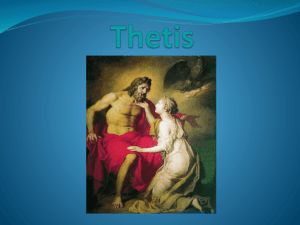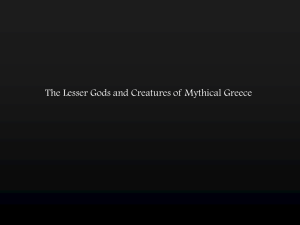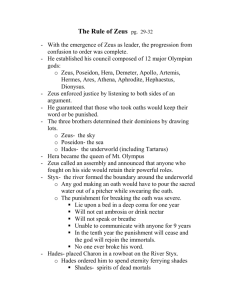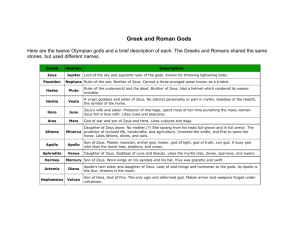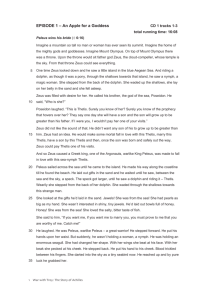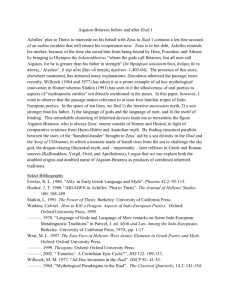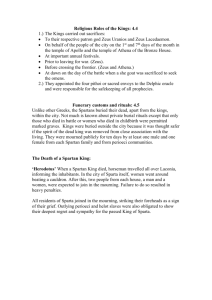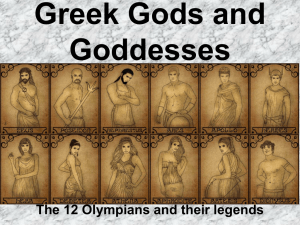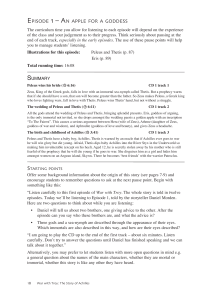Word
advertisement
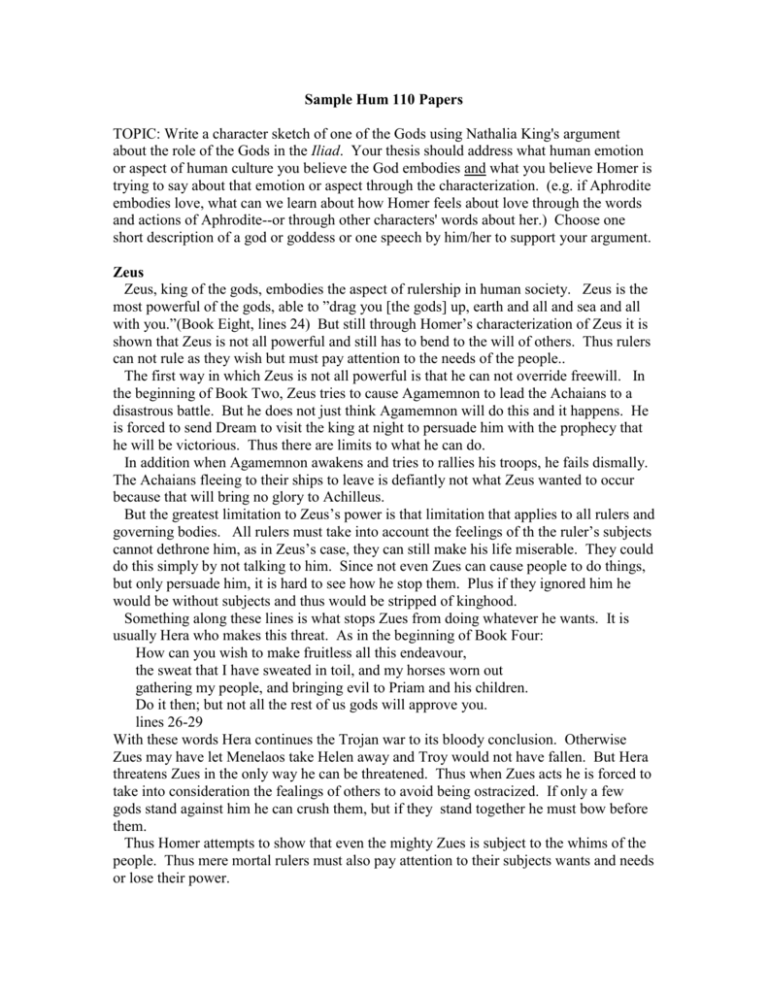
Sample Hum 110 Papers TOPIC: Write a character sketch of one of the Gods using Nathalia King's argument about the role of the Gods in the Iliad. Your thesis should address what human emotion or aspect of human culture you believe the God embodies and what you believe Homer is trying to say about that emotion or aspect through the characterization. (e.g. if Aphrodite embodies love, what can we learn about how Homer feels about love through the words and actions of Aphrodite--or through other characters' words about her.) Choose one short description of a god or goddess or one speech by him/her to support your argument. Zeus Zeus, king of the gods, embodies the aspect of rulership in human society. Zeus is the most powerful of the gods, able to ”drag you [the gods] up, earth and all and sea and all with you.”(Book Eight, lines 24) But still through Homer’s characterization of Zeus it is shown that Zeus is not all powerful and still has to bend to the will of others. Thus rulers can not rule as they wish but must pay attention to the needs of the people.. The first way in which Zeus is not all powerful is that he can not override freewill. In the beginning of Book Two, Zeus tries to cause Agamemnon to lead the Achaians to a disastrous battle. But he does not just think Agamemnon will do this and it happens. He is forced to send Dream to visit the king at night to persuade him with the prophecy that he will be victorious. Thus there are limits to what he can do. In addition when Agamemnon awakens and tries to rallies his troops, he fails dismally. The Achaians fleeing to their ships to leave is defiantly not what Zeus wanted to occur because that will bring no glory to Achilleus. But the greatest limitation to Zeus’s power is that limitation that applies to all rulers and governing bodies. All rulers must take into account the feelings of th the ruler’s subjects cannot dethrone him, as in Zeus’s case, they can still make his life miserable. They could do this simply by not talking to him. Since not even Zues can cause people to do things, but only persuade him, it is hard to see how he stop them. Plus if they ignored him he would be without subjects and thus would be stripped of kinghood. Something along these lines is what stops Zues from doing whatever he wants. It is usually Hera who makes this threat. As in the beginning of Book Four: How can you wish to make fruitless all this endeavour, the sweat that I have sweated in toil, and my horses worn out gathering my people, and bringing evil to Priam and his children. Do it then; but not all the rest of us gods will approve you. lines 26-29 With these words Hera continues the Trojan war to its bloody conclusion. Otherwise Zues may have let Menelaos take Helen away and Troy would not have fallen. But Hera threatens Zues in the only way he can be threatened. Thus when Zues acts he is forced to take into consideration the fealings of others to avoid being ostracized. If only a few gods stand against him he can crush them, but if they stand together he must bow before them. Thus Homer attempts to show that even the mighty Zues is subject to the whims of the people. Thus mere mortal rulers must also pay attention to their subjects wants and needs or lose their power. Thetis Though she may seem at first like a comparatively minor character, the goddess Thetis offers great insight into the attitudes of Homer towards one of the major themes of the Iliad--fate. While she does what she can to assist her son, the tragic hero of the epic, the overriding theme of Thetis’ life is the acceptance of that which is destined to happen. From long before the poem begins, Thetis has been a tool used by the other gods, or alternately, a mere victim of events larger than herself. The first mentioned instance of this is her marriage to Peleus, a mortal favored by the other gods. In book eighteen she says to Hephaistos, (432-435), “Of all the other sisters of the sea he [Zeus] gave me to a mortal, to Peleus, Aiakos’ son, and I had to endure mortal marriage though much against my will.” She didn’t want to marry a mortal, and though she speaks of it bitterly, she never questions the finality of the Zeus’ decision. There are times in the poem when Thetis attempts to affect the outcome of the war by helping Achilleus. Most notably, she accepts his request that she go to Zeus and beg him to turn the tide of the war towards the Trojans, to the (indirect) glory of her son. Zeus’ acceptance of her plea does indeed turn the heads of the other gods, but important to point out is that, even here, Thetis acts against her better judgment, and her request ends up leading to the fulfillment of the prophesy of her sons’ death. In a later attempt to make things better for Achilleus, Thetis goes to Hephaistos for armor to replace that stolen from the dead Patroklos by Hektor. While still intervening on her son’s behalf, Thetis never attempts to dissuade him from the fight; on the contrary, her gift merely makes the fulfillment of his destiny easier. The final and most tragic of Thetis’ submissions to destiny occurs at the end of the poem. Her first words upon hearing from Achilleus of Patroklos’ death are, (Book XVIII, 95-96), “Then I must lose you soon, my child, by what you are saying, since it is decreed your death must come soon after Hektor’s.” Later, while relaying the story to Hephaistos, she says, (Book XVIII, 442-443), “Yet while I see him live and he looks on the sunlight, he has sorrows, and though I go to him I can do nothing to help him.” Finally in Book twenty-four, after Hektor has died and it is only a matter of time before Achilleus shall too, she is described as already in deep mourning. (Book XXVI, 82-86) “She [Iris] found Thetis inside the hollow of her cave, and gathered about her sat the rest of the sea goddesses, and she in their midst was mourning the death of her blameless son, who so soon was destined to die in Troy of the rich soil, far from the land of his fathers.” The image of Thetis mourning in her black veil (“and there is no darker garment”) before her son has actually died sends a clear message of the uselessness of fighting destiny, and Thetis, the divinity, serves as an example to all of the mortals who consider themselves so powerful in the world of Homer’s Iliad.


